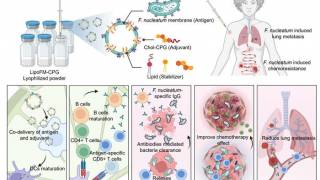Heplisav-B Vaccine is Now Recommended for Adults

According to the Advisory Committee on Immunization Practices (ACIP), one hepatitis B vaccine delivers the best prevention from this type of hepatitis.
People with a chronic hepatitis B virus (HBV) infection are at an increased risk for cirrhosis and liver cancer and require medical care.
Hepatitis B vaccination is the primary means of preventing infections and complications caused by HBV, says the ACIP, but vaccinations are not for people who already have Hepatitis B.
The ACIP is now recommending Heplisav-B (HepB-CpG) for adults over the age of 18 years old.
Heplisav-B was approved by the Food and Drug Administration (FDA) during November 2017 and is the 5th inactivated Hepatitis B vaccine currently recommended by the FDA.
Heplisav-B is a yeast-derived vaccine prepared with a novel adjuvant, administered as a 2-dose series, over 1 month. HepB-CpG is available in single-dose 0.5 mL vials.
Each dose contains 20 μg of HBsAg and 3,000 μg of 1018 adjuvant and is formulated without preservatives.
From a clinical review perspective, the seroprotective antibody to hepatitis B surface antigen (anti-HBs) levels were achieved in 90%–100% of subjects receiving Heplisav-B, compared with 70.5%–90.2% of subjects receiving Engerix-B.
To make this recommendation, the ACIP Hepatitis Vaccines Work Group conducted a systematic review of the evidence, including information from:
- 4 randomized controlled clinical trials assessing prevention of HBV infection, and
- 6 randomized controlled trials assessing adverse events in adults.
Post-licensure surveillance studies pertaining to the use of HepB-CpG will be reviewed by ACIP as they become available, and recommendations will be updated as needed.
Future economic analyses might inform cost-effectiveness considerations of HepB-CpG, including its use among persons at an increased risk for vaccine non-response.
HBV is transmitted through puncture through the skin or direct contact with mucous membranes exposure to infectious blood or body fluids.
HBV is highly infectious, can be transmitted in the absence of visible blood, and remains viable on environmental surfaces for at least 7 days, says the ACIP.
An estimated 248 million people have chronic HBV infection globally.
Which means, HepB vaccines should also be given to those traveling internationally to countries that have high or intermediate levels of endemic HBV infection or countries with HBsAg prevalence of 2% or higher, says the CDC.
The CDC Vaccine Price List provides current HBV vaccine contract prices and general information, and vaccine discounts can be found here.
Vaccines, like any medicine, can have side effects, says the CDC. You are encouraged to report negative side effects of vaccines to the FDA or CDC.
These researchers did not disclose any conflicts on interest: Schillie S, Harris A, Link-Gelles R, Romero J, Ward J, Nelson N. Recommendations of the Advisory Committee on Immunization Practices for Use of a Hepatitis B Vaccine with a Novel Adjuvant. MMWR Morb Mortal Wkly Rep 2018;67:455–458.
Our Trust Standards: Medical Advisory Committee
- Recommendations of the Advisory Committee on Immunization Practices for Use of a Hepatitis B Vaccine with a Novel Adjuvant
- Infectious Diseases Related to Travel
- Prevention of Hepatitis B Virus Infection in the United States: Recommendations of the Advisory Committee on Immunization Practi
- HEPLISAV-B
- Two-Dose Hep B Vaccine Approved by CDC
- HIGHLIGHTS OF PRESCRIBING INFORMATION


























